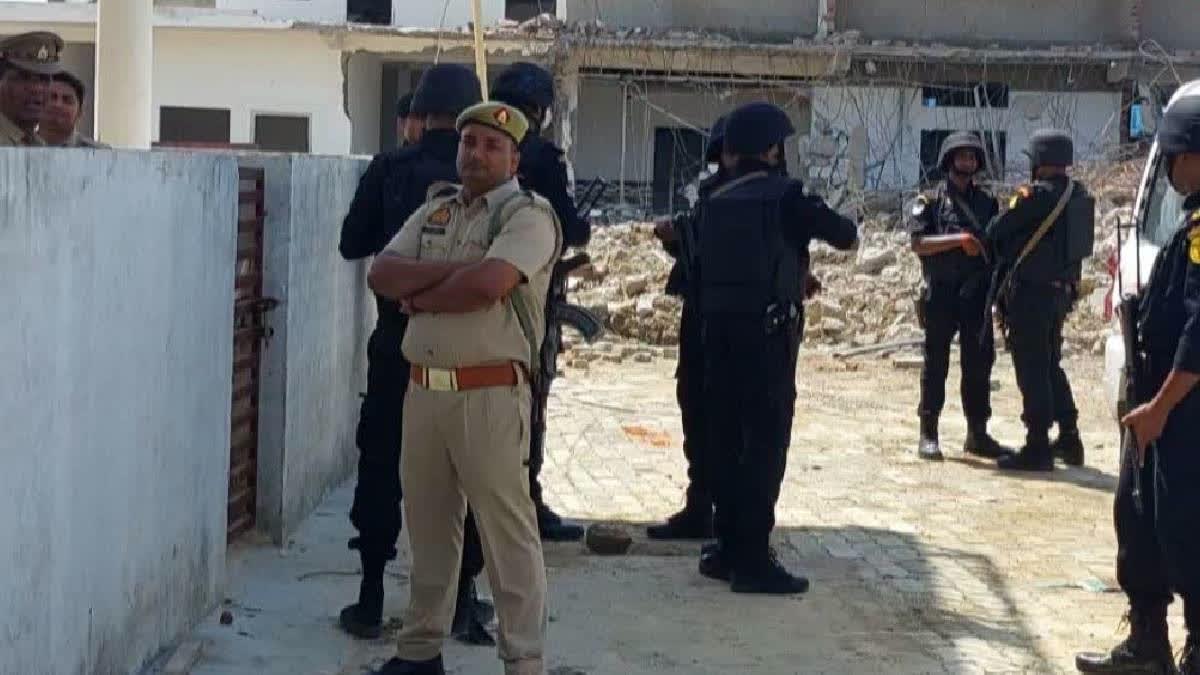Origins and Rise to Infamy
Lucknow : Jamaluddin Shah, alias Maulana Chhangur Baba, began his journey in the small village of Rehra Mafi in Balrampur, Uttar Pradesh, as a modest vendor of rings, amulets, and taweez (religious charms). Born with six fingers on his right hand, earning him the nickname ‘Chhangur,’ he initially operated as a small-time gemstone seller. Over time, he transformed into a self-styled Sufi spiritual leader, adopting the persona of ‘Pir Baba’ or ‘Haji Pir.’ By projecting himself as a holy man, he gained the trust of rural communities, particularly Hindus, in Balrampur and surrounding areas. His rise from a trinket seller to a powerful figure was marked by the construction of dargahs, including the Chand Auliya Dargah, where he organized large gatherings attended by both Indian and foreign nationals.
Chhangur’s operations began to take a sinister turn as he allegedly orchestrated a large-scale religious conversion racket. His network, initially centered in Balrampur, exploited emotional and financial vulnerabilities, targeting impoverished Hindu families, Scheduled Castes, and women through promises of spiritual healing, economic aid, and miraculous solutions. He published a book, Shijra-e-Tayyaba, to promote Islamic teachings and used psychological manipulation to coerce conversions. His influence grew over 15 years, evolving from local operations to a transnational syndicate with ties to Nepal, the Middle East, and possibly Pakistan.
The Conversion Network: Structure and Methods
Chhangur Baba’s syndicate was highly organized, employing coded language to evade detection. Terms like “Project” (for targeted Hindu women), “Mitti Palatna” (conversion), “Kajal Karna” (mental manipulation), and “Darshan” (meeting Chhangur) were used to coordinate activities. The network allegedly targeted over 4,000 individuals, with claims of converting more than 1,500 Hindu women through coercion, financial incentives, and threats. Tactics included honey-trapping, where men posed as Hindus to lure women with promises of jobs, scholarships, or marriage, only to blackmail them with explicit videos or threats of defamation. A victim reported that an associate named Miraj showed her father compromising videos to pressure her family.
The operation extended beyond Uttar Pradesh to Maharashtra (Mumbai, Pune, Nagpur), Bihar, Karnataka, and Nepal’s border districts like Kathmandu and Banke. Chhangur’s key aides included Neetu (alias Nasreen), Naveen Rohra (also alias Jamaluddin), his son Mehboob, and Rashid Shah, who managed the “love jihad” wing. The syndicate allegedly used fake identities, proxy transactions, and shell companies to obscure financial trails. Chhangur’s mansion in Utraula, Balrampur, served as a hub, housing an unauthorized madrasa, hospital, and religious school, all demolished on July 6, 2025, for illegal construction.
Financial Empire and Foreign Funding
The Enforcement Directorate (ED) uncovered a financial web involving over Rs 300–500 crore, with Rs 106 crore traced to foreign sources, primarily from Middle Eastern countries like the UAE, Oman, Qatar, Saudi Arabia, and Turkey, often routed through Nepal. Approximately Rs 68 crore was found in 18 of 100 suspected bank accounts, with Rs 7 crore received in just three months. Chhangur’s associate Naveen, who filed an affidavit in 2021 declaring his conversion and loyalty to Chhangur, made 19 trips to the UAE, raising suspicions of hawala operations and ideological networking. A Swiss bank account linked to Naveen and a Rs 200 crore land deal in Lonavala, Pune, involving proxy transactions with businessman Mohammad Ahmad Khan, are under scrutiny.
Funds were allegedly laundered through NGOs posing as charitable organizations, violating the Foreign Contribution Regulation Act (FCRA). These resources supported conversion activities and the acquisition of benami properties worth over Rs 300 crore across multiple states. Chhangur’s lavish lifestyle, including luxury vehicles, exotic animals, and a 40-room mansion, reflected his amassed wealth. The ED’s raids on July 17, 2025, at 14 locations (12 in Balrampur, two in Mumbai) recovered land documents, gold, and unaccounted cash, further exposing the syndicate’s financial depth.
Alleged Terror Links and Political Connections
Investigations by the Uttar Pradesh Anti-Terrorism Squad (ATS) and the National Investigation Agency (NIA) suggest deeper implications. Chhangur’s network reportedly had ties to the Mukhtar Ansari crime syndicate, known for extortion and political intimidation, and possible connections to Pakistan’s ISI, hinting at a broader agenda to alter India’s religious demographics. Uttar Pradesh Chief Minister Yogi Adityanath labeled Chhangur’s activities “anti-national,” accusing him of plotting to make India an Islamic nation by 2047. The ATS uncovered coded communications and a network of agents, including local police and bureaucrats, who allegedly protected Chhangur. A profit-sharing deal involving Sangita Devi, wife of a Balrampur court clerk, raised concerns about bureaucratic complicity.
The Bharat Pratikaar Sangh, a Nagpur-based outfit where Chhangur served as Uttar Pradesh president, is under investigation as a front for channeling foreign funds. Claims of ISI involvement and a terror factory operating from Chhangur’s properties remain under probe, though evidence is inconclusive. The syndicate’s reach into Uttarakhand, particularly Moradabad, indicates an expanding influence, with allegations of targeting vulnerable communities under the guise of social outreach.
Crackdown and Arrests
The Uttar Pradesh Special Task Force (STF) initiated the probe following complaints, including a 2022 case from a Dalit Hindu family accusing Chhangur of coercion. The ATS took over, arresting Naveen and Mehboob in April 2025, followed by Chhangur and Neetu on July 5, 2025, in Lucknow. Rashid Shah was apprehended on July 17, 2025, for managing the “love jihad” wing. The ED registered a case under the Prevention of Money Laundering Act (PMLA), conducting raids that exposed the syndicate’s scale. Chhangur’s properties, including his Utraula mansion, were demolished, and his assets are targeted for seizure.
Despite the crackdown, Chhangur denied the allegations, claiming innocence. However, victim testimonies, including a survivor’s account of escaping after three months and facing threats, paint a grim picture. The ATS is examining encrypted communications and electronic devices to uncover further links, while the NIA and Intelligence Bureau (IB) probe international connections.
Sociopolitical Impact and Ongoing Investigations
The case has reignited debates on “love jihad” and forced conversions, with Hindu organizations demanding an NIA probe and stricter oversight of madrasas. Public outrage in Balrampur and beyond stems from the syndicate’s exploitation of vulnerable communities and alleged foreign backing. The investigation continues to unravel Chhangur’s network, focusing on financial trails, international handlers, and potential terror links. The ED and ATS aim to identify all associates, including property managers and NGOs, to dismantle the syndicate fully.
The story of Maulana Chhangur reveals a complex web of deception, financial crime, and alleged ideological warfare, raising questions about the extent of such networks in India. As agencies deepen their probe, the case underscores the challenges of combating organized crime disguised as spiritual or charitable endeavors.





